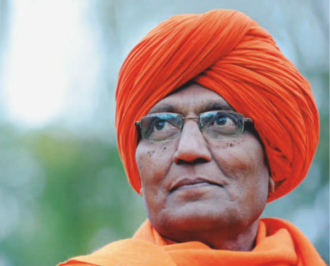But he did not see a distinction. He had decided early, under the influence of the Arya Samaj movement and the works of Gandhi and Marx, that his dharma or spiritual duty was to go among the poor, serving them. He called this “Vedic socialism”; and though completely guided by the Vedas, the most sacred texts of Hinduism, it had to involve political action.
但他看不出有什么区别。他很早就决定,在雅利安社运动以及甘地和马克思著作的影响下,他的法则或精神职责就是到穷人中间去,为他们服务。他称之为“吠陀社会主义”;尽管完全由《吠陀经》(印度教最神圣的经文)指导,它还是得必须涉及政治行动。
When followers treated him as a monk, bending to touch his feet in respect, he would tell them to stop; he might recite a verse from an Upanishad one moment, but the next he would be quoting, by paragraph number, an article of national law. In the late 1970s he actually became a politician in Haryana, and briefly education minister. But he fell out with the government when police fired on protesting bonded workers, and after that he was a one-man political party.
当信徒们把他当作和尚,弯下腰来尊敬地摸他的脚时,他会让他们停下来;他可以在某一时刻背诵奥义书中的一段诗,但接下来,他会根据段落编号,引用国内法的一项条款。在20世纪70年代末,他实际上成为了哈里亚纳邦的一名政治家,并短暂地担任了教育部长。但当警察向抗议的保税工人开枪时,他与政府发生了争吵,此后他成为了一个人的政党。

As such, he cast his interests wide. He took up the cause of tribal peoples without land rights and of farmers who could not get fair prices. He campaigned for better treatment of Dalits overall and pushed for laws empowering women, leading marches across India to protest against sati and female foeticide. In the villages, where he explained that God had created the Sun and Moon for men and women alike, he was feted as a celebrity, garlanded with marigolds and led round on elephants.
因此,他把自己的兴趣放得很广。他为没有土地权利的部落人民和无法获得公平价格的农民进行了斗争。他为改善达利人的整体待遇而举行运动,推动法律赋予妇女权力,领导了印度各地的游行,抗议寡妇自焚和女性堕胎。在村子里,他解释说上帝为男人和女人创造了太阳和月亮,他像名人一样受到礼遇,戴着金盏花的花环,骑着大象走来走去。
译文由可可原创,仅供学习交流使用,未经许可请勿转载。













